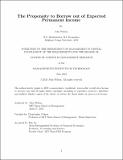| dc.contributor.advisor | Palmer, Christopher | |
| dc.contributor.author | Wilson, John | |
| dc.date.accessioned | 2023-07-31T19:24:37Z | |
| dc.date.available | 2023-07-31T19:24:37Z | |
| dc.date.issued | 2023-06 | |
| dc.date.submitted | 2023-06-27T15:24:30.795Z | |
| dc.identifier.uri | https://hdl.handle.net/1721.1/151232 | |
| dc.description.abstract | One prediction of the Permanent Income Hypothesis is that households who are illiquid may wish to borrow against future income when there is a positive shock to their future income process. We informally model this prediction in a two-period setting and then test it using Equifax data. We demonstrate that Democrats experience a strong, positive shock to their expectations about their future real income around the 2020 presidential election. Our difference-in-difference analysis finds that in response Democrats were 0.08% more likely to take on debt in order to buy a car, and that their outstanding auto loan balance increased by $104 on average. Compared to the rate at which Democrats purchased cars via loan prior to the election, this 0.08% increase represents a 1.37% increase in the purchase rate. We validate our results by finding a similar result holds for installment loan purchases. We show that this result is robust to our empirical assumptions. | |
| dc.publisher | Massachusetts Institute of Technology | |
| dc.rights | In Copyright - Educational Use Permitted | |
| dc.rights | Copyright retained by author(s) | |
| dc.rights.uri | https://rightsstatements.org/page/InC-EDU/1.0/ | |
| dc.title | The Propensity to Borrow out of Expected Permanent Income | |
| dc.type | Thesis | |
| dc.description.degree | S.M. | |
| dc.contributor.department | Sloan School of Management | |
| mit.thesis.degree | Master | |
| thesis.degree.name | Master of Science in Management Research | |
